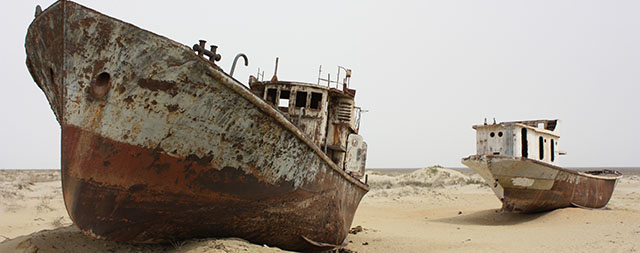Aktuelles
30.10.2015
Vortrag: "The Aral Sea: from disaster to partial recovery? Living with environmental change in Soviet and post-Soviet Kazakhstan“

Herr William Wheeler, PhD candidate im Anthropology Department, Goldsmith College, University of London, wird sich vom 2. bis zum 6. November auf Einladung der Teilprojektgruppe E05 – „Versalzung und Bodendegradation als Bedrohung agrarischer Ordnung“ als Gast des SFBs in Tübingen aufhalten. Am kommenden Donnerstag hält William Wheeler einen öffentlichen Vortrag mit dem Titel
"The Aral Sea: from disaster to partial recovery? Living with environmental change in Soviet and post-Soviet Kazakhstan“.
Ort: Schloss Hohentübingen, Raum 03
Zeit: Donnerstag, 5. November 2015, 18 Uhr c.t.
Abstract des Vortrags: The desiccation of the Aral Sea, brought about by Soviet irrigation policies, is famous across the globe as one of the biggest man-made disasters of the twentieth century, entailing the collapse of the fishing industry, depletion of pastures, change in climate, and a myriad of health problems. Yet my ethnographic research on the Kazakh coastline of the Aral Sea suggests that locally, the sea’s desiccation is not conceptualised as a disaster, and indeed, the disaster label is sometimes resisted.
In particular, people point to the measures taken by the Soviet authorities to provide employment even after the sea had dried up, and they present the disintegration of the Soviet Union and subsequent economic crisis as the major rupture. However, even if the disaster label does not match local perceptions, it has been effective in rallying international actors who have provided funds for projects to deal with the problem. Though many of these projects have been unsuccessful, in recent years a World Bank project has restored a small part of the North Aral Sea, and the fishing industry in the Kazakh part of the region has recovered to some extent.
While this has brought some measure of prosperity to the fishing villages around the North Aral Sea, the former port of Aral’sk remains depressed, and despite the abundance of fish in the sea, the largest fish factory in the town stands idle most of the time. Furthermore, there are shortcomings in the regulation of the fishing industry: quotas are not respected, which raises the question of how sustainable this resource exploitation will be in the long run. This talk thus points to the complex entanglement of environmental change with other forms of change, in particular the changes in the political economy following the collapse of the USSR.
